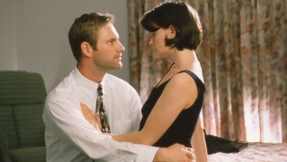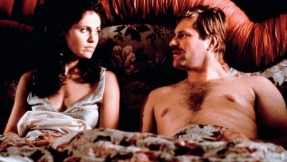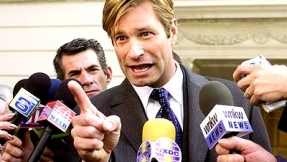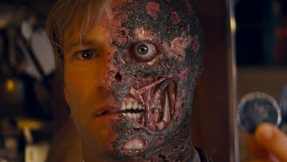Aaron Eckhart: The Go-To Actor for Dualism?
I was sitting around recently, bored out of my mind (which seems to happen a lot). I desperately needed something to do. And just when I almost subjected myself to the torture of going on a walk in the excessive heat, I turned to my left and saw all of my DVDs. So, I took off my shoes and went to skim my DVDs to find one (or three… or five) to watch. As I was looking them over, I noticed I had several movies starring Aaron Eckhart. And then I realized that in these particular films, Eckhart frequently plays a character with varying forms of dual personalities, sometimes obvious, sometimes not so obvious. This interested me, so I decided to watch five films where this duality is on display and write about it. The five films I looked at are In the Company of Men, Your Friends and Neighbors, Thank You for Smoking, The Dark Knight, and Rabbit Hole. Each of these films portrays Eckhart’s characters with some form of a dual personality (e.g., good and evil or visible and hidden), and it’s amazing to watch the differences in which Eckhart magnificently changes each role to fit the character and the film.
In the Company of Men (1997) marks the first time that Eckhart entered into the cinematic consciousness with a memorable leading role. Directed by Neil LaBute, In the Company of Men is about two men who decide to play a “game” and get into a relationship with the same girl, play with her emotions, and then dump her at the same time to make her feel horrible. Eckhart, who plays the character of Chad, plays one of these men. Chad is a despicable human, plain and simple. He is the one who devises this appalling game, and in order for the game to work, Chad notes that he has to find the most innocent, pathetic girl possible. If the creation of this game doesn’t make Chad an awful enough person, his deviousness takes a new low when the woman he chooses to be the unwitting victim is a deaf woman who has never really had male attention in her life.
 There is no mistaking that Chad is emotionally vacant. The duality of the character is seen when he is interacting with the female victim, Christine. When he is with Christine, Chad no longer shows obvious signs of emotional vacancy, but rather is the nicest the viewer ever sees him. The extreme shift in his true personality and his personality when with Christine almost has a sociopathic quality to it. For his part, Eckhart deserves great praise for his acting in this film. There are moments when he is interacting with Christine that it sometimes seems like he genuinely likes her and enjoys her company. For many actors, it would be difficult to portray this given the fact that the viewer already knows Chad’s plan. But Eckhart played Chad so well, that at moments it seems his brilliantly callous soul is actually softening—though it never actually does. With the help of Eckhart effortlessly pulling off such a twofold performance as Chad, In the Company of Men eloquently shows that sometimes, as humans, our hearts can be so closed and cold to certain things that we actually forget that feelings exist, and that if we’re not careful, the things we do can emotionally scar someone, permanently hurting them beyond repair.
There is no mistaking that Chad is emotionally vacant. The duality of the character is seen when he is interacting with the female victim, Christine. When he is with Christine, Chad no longer shows obvious signs of emotional vacancy, but rather is the nicest the viewer ever sees him. The extreme shift in his true personality and his personality when with Christine almost has a sociopathic quality to it. For his part, Eckhart deserves great praise for his acting in this film. There are moments when he is interacting with Christine that it sometimes seems like he genuinely likes her and enjoys her company. For many actors, it would be difficult to portray this given the fact that the viewer already knows Chad’s plan. But Eckhart played Chad so well, that at moments it seems his brilliantly callous soul is actually softening—though it never actually does. With the help of Eckhart effortlessly pulling off such a twofold performance as Chad, In the Company of Men eloquently shows that sometimes, as humans, our hearts can be so closed and cold to certain things that we actually forget that feelings exist, and that if we’re not careful, the things we do can emotionally scar someone, permanently hurting them beyond repair.
Eckhart followed up In the Company of Men with another starring role in a LaBute film in 1998, Your Friends and Neighbors. To be fair, it isn’t only Eckhart’s character in this film that displays some form of a dual personality. The whole film itself is about the six characters and their secret lives amongst each other. And even though I would argue Eckhart’s character of Barry is the least dualist in terms of personality out of the six, I still thought this film was worth mentioning (mainly because it’s one of my favorite films). The film focuses on six people, all with intertwining relationships. Some are married, some are friends, and some are lovers. Another interesting point about this film is that not once during Your Friends is Neighbors do the viewers hear a single name of a character; they remain entirely nameless throughout the duration of the film. It isn’t until the credits that you find out their names—which all rhyme. But that’s a different topic, for a different article, at a different time. I digress.
 In this film, it may not be as easy to see how Eckhart portrays a character with dual sides to his personality, especially compared with the other morally questionable characters in the film. But we can see this characteristic a bit throughout the film. His wife is not enjoying sex with him, and Barry isn’t sure why. (His wife eventually starts a sexual relationship with his two best friends.) Unable to have sex with his wife, Eckhart’s character is left to take care of his needs by himself. He discusses the issue with his two best friends. Their relationship is portrayed as the typical homosocial relationship where they discuss many things, especially sex. The intimate conversations about his sex life that he has with his friends he chooses to keep hidden from his wife. He never lets on that their friends know anything. He has two lives: the one with his wife and the one with his friends. The hiddenness is where we see the dual characteristic in Eckhart’s Barry. We can also figure that Eckhart’s character is keeping something hidden from us, the viewer. Every time his wife rejects him sexually and he is forced to finish on his own, he asks the question, “Is it me?” Later in the film, Jason Patric’s character of Cary asks the same question. But instead of leaving it as an unanswered question like Barry does, he answers the question himself with the response, “I don’t think so.” His answering of the question expresses to the viewer what Eckhart’s character really means when asking it—the whole thing is purely narcissistic. Eckhart’s Barry isn’t being forthcoming with the viewer in his words by not openly expressing what he actually means, thus creating another level of dualism to his character through hiding the truth from the viewer as well as his wife.
In this film, it may not be as easy to see how Eckhart portrays a character with dual sides to his personality, especially compared with the other morally questionable characters in the film. But we can see this characteristic a bit throughout the film. His wife is not enjoying sex with him, and Barry isn’t sure why. (His wife eventually starts a sexual relationship with his two best friends.) Unable to have sex with his wife, Eckhart’s character is left to take care of his needs by himself. He discusses the issue with his two best friends. Their relationship is portrayed as the typical homosocial relationship where they discuss many things, especially sex. The intimate conversations about his sex life that he has with his friends he chooses to keep hidden from his wife. He never lets on that their friends know anything. He has two lives: the one with his wife and the one with his friends. The hiddenness is where we see the dual characteristic in Eckhart’s Barry. We can also figure that Eckhart’s character is keeping something hidden from us, the viewer. Every time his wife rejects him sexually and he is forced to finish on his own, he asks the question, “Is it me?” Later in the film, Jason Patric’s character of Cary asks the same question. But instead of leaving it as an unanswered question like Barry does, he answers the question himself with the response, “I don’t think so.” His answering of the question expresses to the viewer what Eckhart’s character really means when asking it—the whole thing is purely narcissistic. Eckhart’s Barry isn’t being forthcoming with the viewer in his words by not openly expressing what he actually means, thus creating another level of dualism to his character through hiding the truth from the viewer as well as his wife.
 In 2005, Eckhart played the morally ambiguous lead in the Jason Reitman film Thank You for Smoking. A lobbyist for a big tobacco company, Eckhart played Nick Naylor, a talking head that would spin the truth about negative tobacco facts. It is Nick’s words that portray Eckhart’s character as having two sides to him. We get the impression that Nick actually does know the consequences of smoking. But day after day he doesn’t disclose the full truth to the public and continues on with his job. Early in the film, Nick tells a boy with cancer (named “Cancer Boy”) that he wants him to live because then the boy can keep smoking, which puts money in Nick’s pocket. Ultimately, Nick is hiding what he knows to be true health risks inside of him and preaching an extremely skewed version of the truth just to make a dollar.
In 2005, Eckhart played the morally ambiguous lead in the Jason Reitman film Thank You for Smoking. A lobbyist for a big tobacco company, Eckhart played Nick Naylor, a talking head that would spin the truth about negative tobacco facts. It is Nick’s words that portray Eckhart’s character as having two sides to him. We get the impression that Nick actually does know the consequences of smoking. But day after day he doesn’t disclose the full truth to the public and continues on with his job. Early in the film, Nick tells a boy with cancer (named “Cancer Boy”) that he wants him to live because then the boy can keep smoking, which puts money in Nick’s pocket. Ultimately, Nick is hiding what he knows to be true health risks inside of him and preaching an extremely skewed version of the truth just to make a dollar.
It is Nick’s struggle with his morals that makes the duality to his character interesting. Initially, it’s hard to believe a guy like Nick even has morals. Nick himself says his job requires a certain moral flexibility. But when we begin to see interactions with Nick and his son, we see some form of morals showing through in Nick’s character. Toward the end of the film, Nick openly says in front of Congress that if his son, when he turns 18-years-old, wanted a cigarette, he would buy him his first pack. However, when he walks out of the room there is clearly anguish and regret on Nick’s face. We begin to immediately think Nick is questioning himself for his comment. The duality we see in Nick’s character is always internal/external. What he believes on the inside isn’t always what he perpetuates to the public. The film presents an interesting, and often hysterical way for the viewers to introspectively look at themselves and debate what it is they may be putting out to the world and examine if it’s who they truly are or what they fully think and believe.
Probably the most recognizable title of the films I’ve listed, The Dark Knight (2008) is the second installment of director Christopher Nolan’s Batman trilogy. In the film, Eckhart plays District Attorney Harvey Dent. Initially, Dent wants what is best for Gotham City. He is in favor of allowing Batman to remain on the streets to help clean up crime. And for his part, Dent does what he can to also help clean up the streets of the city. Pretty much everything he does is to help the citizens of Gotham City. But the dual side of his character eventually comes out after the Joker kidnaps him and his girlfriend, Rachel Dawes. Trapped in two different locations, the Joker has arranged it where Batman and Police Commissioner Gordon can only save either Harvey or Rachel and the other will be blown up. It is Dent who is saved and Rachel who dies.
 During this ordeal, half of Dent’s face is burned off. (He is now Two-Face.) This is an outward manifestation of his dual personality. He goes from one of the guys trying to protect Gotham City, to one of the guys terrorizing Gotham City. Angry toward those he deems responsible for Rachel’s death, Dent seeks out a type of vigilante justice. But he takes it too far as he has become murderously vindictive and at one point holds a gun to Police Commissioner Gordon’s young son’s head, threatening to kill him. This was his attempt to get back at Gordon, one of the people he thought responsible for Rachel’s death. But his logic has become completely calloused and skewed, as Gordon’s son had absolutely nothing to do with Rachel’s death, yet he is left in fear and danger with a gun to his head. Dent goes from the nice guy trying to help, to the evil guy ruthlessly killing and terrorizing. This depiction of Dent’s dual persona shows us that there can be a monster that lies within each of us, ready to be unleashed at the slightest event that upsets or infuriates us.
During this ordeal, half of Dent’s face is burned off. (He is now Two-Face.) This is an outward manifestation of his dual personality. He goes from one of the guys trying to protect Gotham City, to one of the guys terrorizing Gotham City. Angry toward those he deems responsible for Rachel’s death, Dent seeks out a type of vigilante justice. But he takes it too far as he has become murderously vindictive and at one point holds a gun to Police Commissioner Gordon’s young son’s head, threatening to kill him. This was his attempt to get back at Gordon, one of the people he thought responsible for Rachel’s death. But his logic has become completely calloused and skewed, as Gordon’s son had absolutely nothing to do with Rachel’s death, yet he is left in fear and danger with a gun to his head. Dent goes from the nice guy trying to help, to the evil guy ruthlessly killing and terrorizing. This depiction of Dent’s dual persona shows us that there can be a monster that lies within each of us, ready to be unleashed at the slightest event that upsets or infuriates us.
 The last and most recent film I’m looking at is 2010’s Rabbit Hole. While I love every other film mentioned so far, I have to say not only is Rabbit Hole my personal favorite from these five, but it’s actually one of my favorite films—period. Howie (Eckhart) and his wife, Becca (played by the incomparable Nicole Kidman), struggle to pick up the pieces of their lives and marriage after their young son gets hit by a car and dies after chasing his dog into the street. The patience and intimacy in their marriage has completely disappeared. Both are stricken with grief but deal with it in completely different ways. Initially, the dual nature of Eckhart’s character is seen to be something beneficial, i.e., he will sneak away to a corner of the house and remember his son, mainly by watching a video of his son recorded on his phone. He keeps this hidden from his wife (until she catches him watching it one night) because memories of her son eat away at Becca. Though this is done for his wife’s good, Howie’s dual personality starts to take a darker turn.
The last and most recent film I’m looking at is 2010’s Rabbit Hole. While I love every other film mentioned so far, I have to say not only is Rabbit Hole my personal favorite from these five, but it’s actually one of my favorite films—period. Howie (Eckhart) and his wife, Becca (played by the incomparable Nicole Kidman), struggle to pick up the pieces of their lives and marriage after their young son gets hit by a car and dies after chasing his dog into the street. The patience and intimacy in their marriage has completely disappeared. Both are stricken with grief but deal with it in completely different ways. Initially, the dual nature of Eckhart’s character is seen to be something beneficial, i.e., he will sneak away to a corner of the house and remember his son, mainly by watching a video of his son recorded on his phone. He keeps this hidden from his wife (until she catches him watching it one night) because memories of her son eat away at Becca. Though this is done for his wife’s good, Howie’s dual personality starts to take a darker turn.
After he and Becca go to a support group where other parents share their stories of losing a child, Howie and Becca meet another couple, Gabby and Kevin. After Becca and Kevin stop attending support group, Howie and Gabby keep going together. Eventually, Howie begins smoking marijuana with Gabby in her car. Though Howie keeps this a secret from his wife, Becca can smell it on him. The relationship between Howie and Gabby takes a sharper turn when Howie begins an emotional affair with Gabby, which almost turns into a physical affair. This is unbeknownst to Becca. This shows us a darker side of Howie. It is worth noting that while this is occurring, Becca has been spending time with the teenager who hit and killed her son behind Howie’s back. But the argument can be made that she is doing that because it is therapeutic for her. It is slightly more difficult to write off Howie’s marijuana usage and emotional affair as a step of healing for his grief. Ultimately, Howie turns from this dual, hidden life his character had been leading and re-devotes himself to his wife again. Rabbit Hole is a powerful film of love and loss and the difficulties that come when trying to cope with that loss. Through dynamic acting, the viewer is forced to understand the unbearable thought of losing a child and the pain that comes with it. The viewer is then made to analyze in himself or herself how they would cope with such a tragic loss. Rabbit Hole takes us through the stages of grief and shows us that different people grieve in different ways, and that sometimes there isn’t always something we can do for others to help them on their path of healing.
After viewing In the Company of Men, Your Friends and Neighbors, Thank You for Smoking, The Dark Knight, and Rabbit Hole, one can see how Aaron Eckhart frequently and skillfully pulls off characters that sometimes have diametrically opposed traits. It’s even more amazing that within the same film he can go from 0 to 60 in terms of personality at the snap of a finger. Even if he is portraying a similar character in different films, Eckhart has a way of making that character feel new each time. And what is great is that with his performances, the viewers are forced to become conscious of something about themselves or others around them in hopes of giving us a better understanding for one another. I have said for a while that Eckhart is perhaps underappreciated in the film world, and it is my opinion that his performances in these five films display why there should be a greater appreciation for what he brings to the characters that he plays and his contribution to cinema in general.
What do you think? Leave a comment.











Dark Knight was the first film I ever saw him in. When they first introduced his character I was fully prepared to hate/ignore him in what I thought was a stock Rachel’s-DA-Boyfriend-Of-The-Week type of role, but by the end of the film I was blown away. I walked out of the theater loving him.
I’ve only watched ‘Thank you for Smoking’ and ‘The Dark Knight’, and I agree that he was very underrated/unappreciated. He’s such a good actor!
This is strange but every time that I see him, I go like “Oh yeah, I love that guy”. Im sure Im not the only one 😛
He did a good job in The Dark Knight, but I still would’ve preferred Liev Schrieber.
Very strong article. I remember watching an interview with Nicole Kidman about Rabbit Hole and she said she wanted Eckhart to play the role of the grieving husband because she viewed him as an underrated actor who needed a challenging role to prove himself. He certainly did so in that devastating film. It’s sort of a shame that he is best known for his role in Batman because his work in independent films like Rabbit Hole, Conversations with Other Women, Possession, and the ones you mention are more representative of his talent.
I agree that it’s somewhat of a shame that people mostly know him from “The Dark Knight.” Don’t get me wrong, I love the film and him in it, and while he is excellent in it, I don’t think it’s the best representation of his true talent. I have yet to see “Conversations with Other Women,” but I’ve wanted to see it for a while now. It’s on my short-list of films to watch in the near future. In general, I also think Helena Bonham Carter is great, so I figured I would likely enjoy at least some aspect of the film if two actors I really admired were in it.
I loved him in the Dark Knight. Were it not for the whole Heath Ledger thing, it would have been the film that broke him into the mainstream. As it was, everyone, including him, was overshadowed.
Having watched Rabbit Hole last night I agree that Aaron Eckhart is definitely an actor that is significantly underrated and deserves more praise for his ability to perform challenging and complex roles. His performance in said film was fantastic.
Wholeheartedly agree!
Great article! I think he is another actor who is very charismatic but, more often than not, shows up in bad movies (Battle: LA). However, he can stand above the material and deliver truly interesting performances. In Olympus Has Fallen, he delivers a good performance despite being in only a small portion of the film.